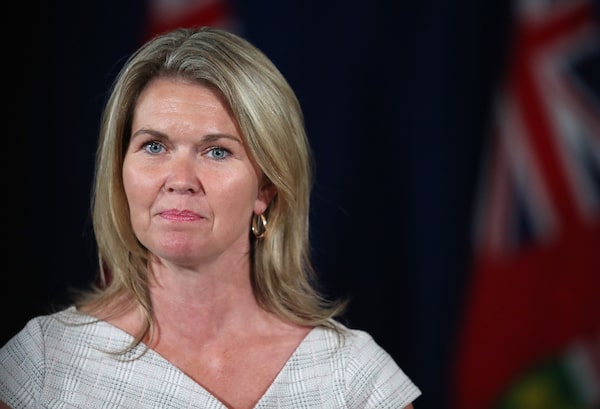
Ontario Associate Minister of Children and Women's Issues Jill Dunlop makes an announcement at the daily briefing on COVID-19 at the legislature in Toronto on June 25, 2020.Steve Russell/The Canadian Press
The Ontario government released its plan to update the province’s child welfare system on Wednesday, saying its new strategy will focus on prevention and early intervention.
The government, which announced no funding on Wednesday, said its new system will focus on priorities such as ensuring community-based prevention services are designed to keep children safe in family environments and improving the quality of residential care for children and youth.
More than 12,000 children and youth are in the care of children’s aid societies in Ontario.
In an interview with The Globe And Mail on Wednesday, Jill Dunlop, associate minister of children and women’s issues, said the fundamental change being announced is a shift from protection to prevention.
The best place for a child to be raised is with their family, she added.
“Whether that is Mom, Dad, grandparents, aunts and uncles coming together, but really having that support because children who are raised in a group home, we see terrible results,” she said. “The outcomes are not good.”
Former provincial children’s advocate Irwin Elman told The Globe on Wednesday that he is cynical about the modernization and that actions, not words, are required to save lives of children dying in care.
The Aboriginal Peoples Television Network reported last week that 11 Indigenous children died in the past four months connected to Ontario’s child welfare system.
“She [the associate minister] carries the weight of responsibility for every Indigenous and Black child so over-represented in care who were taken from their family,” Mr. Elman said.
“She carries the responsibility for the oppressive challenges children living in care face and their often dismal life outcomes. She has an opportunity. Those children are her legacy.”
Ontario said the new child welfare strategy was developed with input from stakeholders, including youth, families, caregivers, First Nations, Inuit and Métis partners, and community organizations.
The executive director of the Native Child and Family Services of Toronto, Jeff Schiffer, said in a statement he was heartened by the approach to co-develop services with First Nations, Inuit, Métis and urban Indigenous partners to try to reduce over-representation of Indigenous children in the system.
Ontario said there were more than 100 engagement sessions over the past year and that there were more than 3,000 responses provided through an online survey.
Our Morning Update and Evening Update newsletters are written by Globe editors, giving you a concise summary of the day’s most important headlines. Sign up today.
 Kristy Kirkup
Kristy Kirkup